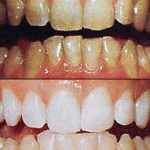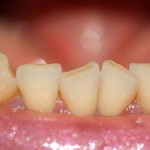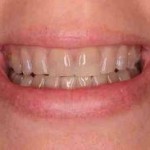Isotretinoin, commonly known as Accutane, is a prescription drug used in the treatment of extreme acne cases. Taken in pill form, the medication can clear up acne in four to six weeks for most users. However, Accutane is also known for causing a side effect that damages work on bleached teeth. The drug reacts to bleached teeth by causing a grayish lines on gum lines and staining the work of the bleach on the teeth, making the teeth yellowish.
Tooth Discoloration
Accutane causes intrinsic discoloration, making the enamel change within the inner structure of the tooth. According to discussions on Acne.org, users of the product noticed effects of “little bright dots, similar to white freckles on teeth.” Such marks on teeth can occur on any of the teeth, with the front teeth the most noticeable. Strong discoloration of any sort can become noticeable in as early as one month from the first dose.
Risk Of Damage To Teeth
It is important to remember that other more important side effects occur more commonly than discoloration on bleached teeth. However, more than 10 reports on Acne.org alone link discoloration to Accutane, specifically in younger patients whose teeth are still developing. The dental site PHC-SSP.ca suggested that younger users who take Accutane pose a higher risk of not only having tooth discoloration but more prominent cases. “While permanent teeth are still developing, there is a higher possibility of them getting affected, because the nutrients and contents of our diet can be incorporated into the developing tooth bud ,” the report reads. “By waiting to take Accutane until teeth are fully developed, the risk of damage lowers significantly.”
Factors For Variations Of Damage
The range of discoloration has many factors. The amount of bleach used on a person’s teeth can determine how significantly the acne medicine responds to the teeth. Likewise, factors such as how often an individual brushes her teeth, and the individual’s level of teeth stainer consumptions, such as coffee and black tea, all cause variations of damage. Age also plays a factor, as older teeth will show fewer signs of discoloration than a younger person’s permanent teeth.
Considerations
Doctors can prescribe a specific medication for acne; if you have teeth bleaching, consider switching to another form of acne treatment that will not affect previous dental work. If you are already taking the medication, Columbia University College of Dental Medicine suggest brushing your teeth twice a day to prevent buildup on enamel and leave teeth more uniform in coloration. Teeth stainers further showcase tooth discoloration; avoiding products such as tea, dark colas, wine and coffee will leave teeth appearing whiter and damage to tooth bleaching less noticeable.
What To Do If Teeth Are Already Stained Due To Medicine
As of 2010, no citations existed of effective preventative measures against damage to bleached teeth. Whitening toothpastes and whitening strips can help blend the teeth colors more closely, giving off a uniform appearance. An expert from PHC-SSP.ca further suggests talking with a dentist on “modifying bleach trays to only bleach the ‘gray’ part of the tooth first. Modifying the trays will stop the over whitening on the incisals.”
Who Else Is Not Suitable For Accutane?
Possible serious side effects of taking Accutane include birth defects and mental disorders.
1. Birth Defects.
Accutane can cause birth defects (deformed babies) if taken by a pregnant woman. It can also cause miscarriage (losing the baby before birth), premature (early) birth, or death of the baby.
Do not take Accutane if you are pregnant or plan to become pregnant while you are taking Accutane. Do not get pregnant for 1 month after you stop taking Accutane. Also, if you get pregnant while taking Accutane, stop taking it right away and call your prescriber.
2.  Mental problems and suicide.
Some patients, while taking Accutane or soon after stopping Accutane, have become depressed or developed other serious mental problems. Symptoms of these problems include sad, “anxious” or empty mood, irritability, anger, loss of pleasure or interest in social or sports activities, sleeping too much or too little, changes in weight or appetite, school or work performance going down, or trouble concentrating.
Some patients taking Accutane have had thoughts about hurting themselves or putting an end to their own lives (suicidal thoughts). Some people tried to end their own lives. And some people have ended their own lives. There were reports that some of these people did not appear depressed. No one knows if Accutane caused these behaviors or if they would have happened even if the person did not take Accutane.
What Should Be Avoided When Taking Accutane?
- Do not get pregnant while taking Accutane.
- Do not breast feed while taking Accutane and for 1 month after stopping Accutane.
It is not known if Accutane can pass through your milk and harm the baby. - Do not give blood while you take Accutane and for 1 month after stopping Accutane.
If someone who is pregnant gets your donated blood, her baby may be exposed to Accutane and may be born with birth defects. - Do not take vitamin A supplements.
Vitamin A in high doses has many of the same side effects as Accutane. Taking both together may increase your chance of getting side effects. - Do not have cosmetic procedures to smooth your skin, including waxing, dermabrasion, or laser procedures, while you are using Accutane and for at least 6 months after you stop.
Accutane can increase your chance of scarring from these procedures. Check with your prescriber for advice about when you can have cosmetic procedures. - Avoid sunlight and ultraviolet lights as much as possible.
Tanning machines use ultraviolet lights. Accutane may make your skin more sensitive to light.


